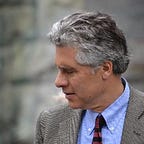“Great Big Beautiful Tomorrow” — Disney, Darwin, and the Mis-Measure of Progress
When I was eight, my family went to the NY World’s Fair in Flushing Meadow, Queens. It was 1964 and the idealized vision of the future that pervaded the fair seemed perfectly natural to many of us. Naturally, we could expect a “great big beautiful tomorrow” (as the GE “Carousel of Progress” sang brightly between stages). That was an article of faith. Tomorrow would be better than today.
I have changed my mind about that. Science alone is not sufficient. Technology can be both our deliverance or our demise. It is up to us to choose, as I have previously written (see “Bending the Arc”). And choosing requires an understanding of our destination and how we will know progress when we see it.
The first day of my college paleontology seminar, Stephen Gould worked to disabuse us of the notion of evolutionary progress. Life was not evolving toward anything. Not to higher beings, or intelligence, or even complexity. It was all about adaptation and survival. So, apparently, nature has no notion of progress, at least according to Gould.
One thing seems certain, however, humans are wired to perceive progresss and to strive for it.
But do we really know what progress looks like? In the thick of the industrial revolution, the image of factories belching smoke was seen as a picture of progress. Now, not so much. Certainly in the thirties many Germans saw the rise of National Socialism as progress. Wrong again. In technology, countless advances, from nuclear power to the internet all have been heralded as the dawn of a new era. We’re still waiting and dealing with the downsides.
To begin with, progress itself is mysterious. It might, for example, be an illusion — for every apparent benefit, something less noticable might be lost. The folks that are nostalgic for our days as hunter-gatherers certainly seem to feel that way. Or maybe, like decreased entropy in physics, progress is purely local — we can create upside around us only by exporting degradation somewhere else. Biology seems to be an example where increased capability and organization in living systems are enabled by dissipating heat and waste into the environment. Perhaps we export our pollution to China or to a floating island of trash island in the Pacific.
We also tend to fall back on economic indicators to measure progress, even though we know they are not the whole story. Butthan famously tracks a “Gross National Happiness” index. Even one of the early developers of national economic metrics, Simon Kuznets, warned that “Goals for more growth should focus on more growth of what and for what” and not become the goal in themselves.
We have long known this. In 1968, Bobby Kennedy, then a candidate for president, warned against counting sprawl and destruction of nature in GNP while surrendering “personal excellence and community values.” More important, he continued, are the things that GNP does not count:
….(GNP) does not allow for the health of our children, the quality of their education or the joy of their play. It does not include the beauty of our poetry or the strength of our marriages, the intelligence of our public debate or the integrity of our public officials. It measures neither our wit nor our courage, neither our wisdom nor our learning,… it measures everything in short, except that which makes life worthwhile….
This two-minute segment of his speech beautifully enumerates the values that fall by the wayside when we focus only on the things that can be measured.
What is true of economics is also true of evolution and of science and of social progress — when we focus on metrics alone, we can miss the point entirely and end up going backward into ignorance and division and fear.
On the other hand, humans have occasionally demonstrated the ability to value and promote “those things that make life worthwhile.” This is hard precisely because these values are intangible. They cannot be completely defined or measured. We know them only when we see them.
Nonetheless, if we wish to see them and to bend the arc toward achieving them, we need to learn to step back, ask ourselves what our metrics are missing and apply our “wit and courage” to fashion different, more human solutions.
